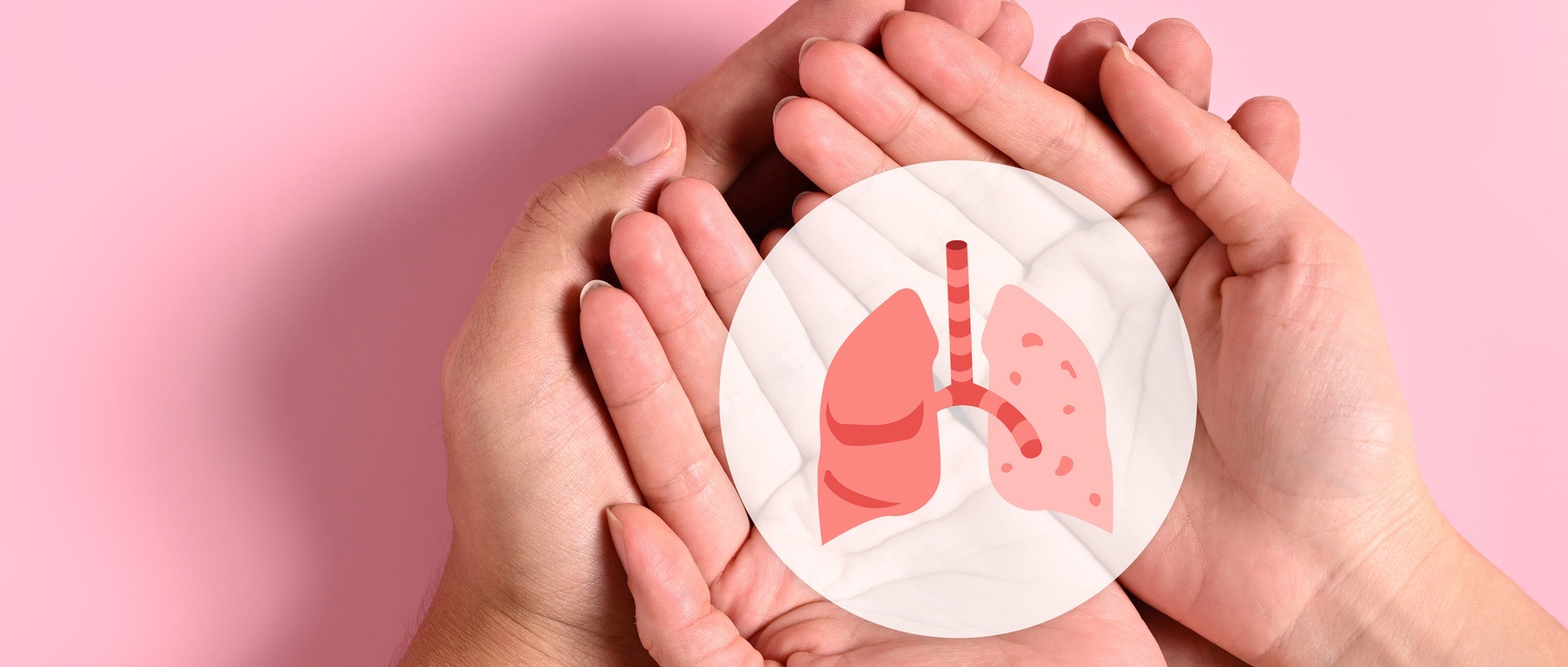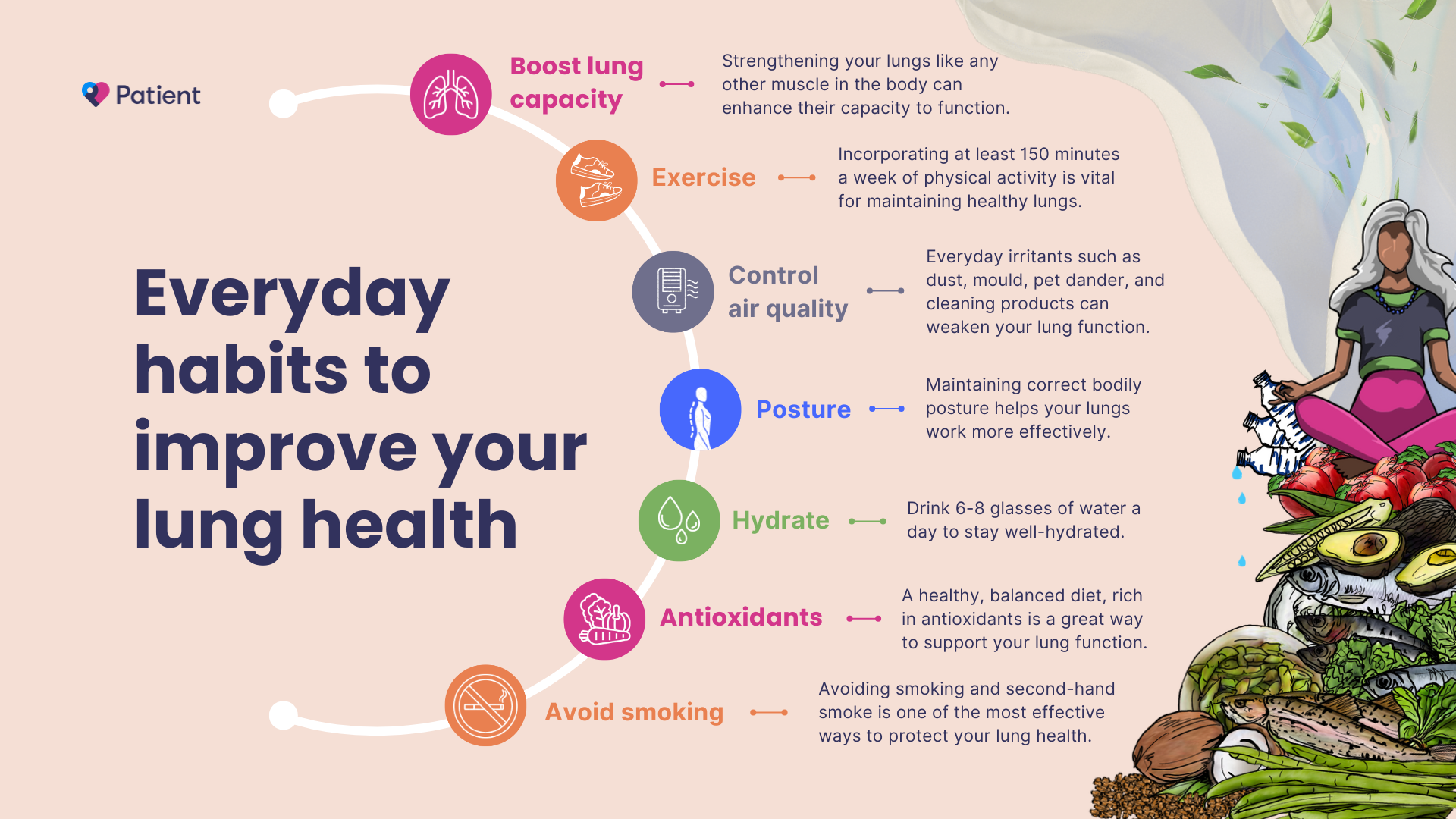
7 everyday habits to improve your lung health
Peer reviewed by Dr Colin Tidy, MRCGPLast updated 22 Oct 2025
Meets Patient’s editorial guidelines
- DownloadDownload
- Share
- Language
- Discussion
Your lungs are your body's lifeline, delivering the oxygen you need to fuel every breath and heartbeat. Caring for your lungs is caring for your life - it's one of the most important things you can do to protect your overall wellbeing. We explore expert-approved lifestyle choices to help boost your lung health and keep them working at their best.
In this article:
Video picks for Lung health
Your lungs are two soft, spongy organs located on either side of your chest. They are responsible for drawing in the air (oxygen) that your body needs. This oxygen is then transferred into your bloodstream and circulated throughout your body.
At the same time, carbon dioxide - a waste from your body - moves from your blood to your lungs and is then breathed out. Your lungs also help protect you by filtering and expelling harmful substances.
Certain lifestyle choices or genetics can impair your lung function, which could lead to serious health conditions, such as chronic obstructive pulmonary disease (COPD), asthma, infections, and even lung cancer.
We asked a doctor for tips on how to keep them working at their best.
7 everyday habits to improve your lung health

Graphic: Ben Hudson
Continue reading below
1. Boost your lung capacity
Daily habits that fortify your lungs can improve how well they work and support your overall health.
Dr Ramit Singh Sambyal, Senior Consultant and Lead, Health City Cayman Islands, Western Caribbean, says that strengthening your lungs - like any other muscle in the body - can enhance their capacity to function.
"Many people don't realise how daily habits can either strengthen or weaken lung function," he says. "Breathing is automatic, but the way we breathe makes a big difference."
Sambyal advises you shift from shallow chest breathing to deep diaphragmatic breathing - also known as belly breathing. This technique can help you breathe better, make your lungs stronger, and increase your stamina.
2. Exercise for healthier lungs
Back to contentsIncorporating at least 150 minutes a week of physical activity a week is vital for maintaining healthy lungs.
"Movement plays a crucial role in lung health," Sambyal explains. "Your lungs thrive on activity, yet exercise is often overlooked as a way to improve breathing."
Sambyal recommends the following forms of exercise to encourage full lung expansion, better oxygen flow and improved circulation:
Cardio workouts - such as brisk walking, swimming, cycling.
Strength training - a strong core supports your diaphragm, making every breath more efficient.
"Even simple activities, such as laughing or singing, help your lungs work harder, improving elasticity and clearing out stale air," he adds.
Continue reading below
3. Control your air quality
Back to contentsThe quality of the air you breathe is an important factor that shouldn't be overlooked.
Sambyal warns that everyday irritants such as dust, mould, pet dander, and chemicals from cleaning products can weaken your lung function over time.
He suggests the following ways to support your respiratory health:
Keep indoor spaces well-ventilated.
Use air purifiers.
Switch to non-toxic cleaning products.
4. Prioritise hydration
Back to contentsYou should aim to drink 6-8 glasses of water a day to keep your body well-hydrated.
Sambyal explains that hydration plays a key role in your lung health as they need moisture to function properly.
He says: "Dehydration can lead to thickened mucus, making it harder for your lungs to expel irritants. Drinking enough water throughout the day helps prevent congestion and keeps them functioning at their best."
Continue reading below
5. Practice good posture
Back to contentsMaintaining correct bodily posture can also help your lungs work more effectively.
Sambyal says that slouching compresses your lungs, limits oxygen intake and can lead to shallower breathing.
He recommends these tips to help your lungs expand better and get more oxygen to your body:
Sit up straight.
Stretch regularly.
Practice breathing-focussed exercises - such as yoga.
6. Nourish your body with antioxidants
Back to contentsA healthy, balanced diet, rich in antioxidants is a great way to support your lung function.
Sambyal advises you incorporate the following antioxidant-rich foods into your meals:
Omega-3 fatty acids.
Vitamin C from leafy greens.
Fatty fish.
Citrus fruits.
Nuts.
"These will all help reduce inflammation and protect your lung tissue," he says. "On the other hand, processed foods and excessive dairy products can increase mucus production, making breathing more difficult."
7. Embrace a smoke-free life
Back to contentsAs we get older, our lung function naturally declines. However, one significant step you can take to reduce these effects is to refrain from smoking.
Sambyal stresses that avoiding smoking and inhaling second-hand smoke is one of the most effective ways to protect your lung health.
He emphasises that even former smokers can take comfort in knowing their lungs remain highly resilient. Lung function can begin to improve within just weeks of quitting smoking.
Sambyal concludes that to keep your lungs healthy, they need daily care and attention.
"Small, consistent lifestyle changes such as deep breathing exercises, staying active, and improving indoor air quality can make a lasting impact on respiratory health," he says. "Eating a lung-friendly diet also plays a key role in supporting long-term lung function."
Patient picks for Lung health

General health and lifestyle
The effect of air pollution on asthma sufferers
Asthma is a common, long-term lung condition that causes inflammation and narrowing of your airways, leading to symptoms such as shortness of breath, wheezing, chest tightness, and coughing. Air pollution can irritate your airways, making your asthma worse. We look at what you can do to ease symptoms and better manage your asthma when pollution is high.
by Lawrence Higgins

Chest and lungs
How to handle asthma during the winter months
Many people with asthma find their symptoms get worse in the winter months. So how can you manage your asthma as the days get colder, and what can you do to avoid triggers?
by Victoria Raw
Continue reading below
Article history
The information on this page is peer reviewed by qualified clinicians.
Next review due: 22 Oct 2028
22 Oct 2025 | Latest version
27 Apr 2025 | Originally published
Authored by:
Victoria RawPeer reviewed by
Dr Colin Tidy, MRCGP

Ask, share, connect.
Browse discussions, ask questions, and share experiences across hundreds of health topics.

Feeling unwell?
Assess your symptoms online for free
Sign up to the Patient newsletter
Your weekly dose of clear, trustworthy health advice - written to help you feel informed, confident and in control.
By subscribing you accept our Privacy Policy. You can unsubscribe at any time. We never sell your data.